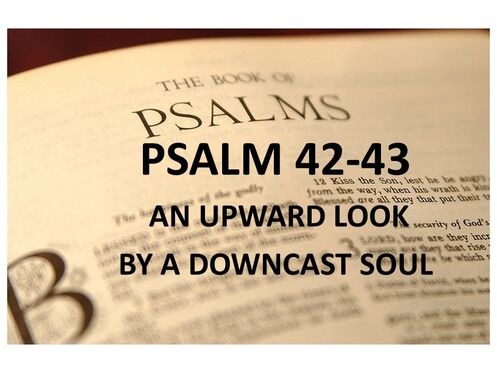Vindicate me, my God, and plead my cause against an unfaithful nation. Rescue me from those who are deceitful and wicked. You are God my stronghold. Why have you rejected me? Why must I go about mourning, oppressed by the enemy? Send me your light and your faithful care, let them lead me; let them bring me to your holy mountain, to the place where you dwell. Then I will go to the altar of God, to God, my joy and my delight. I will praise you with the lyre, O God, my God. Why, my soul, are you downcast? Why so disturbed within me? Put your hope in God, for I will yet praise him, my Savior and my God.
Psalms 42 and 43 was originally one Psalm—as evidenced in several manuscripts, as well as in the repeated refrain "Why, my soul, are you downcast? Why so disturbed within me? Put your hope in God, for I will yet praise him, my Savior and my God." in verses 5 and 11 Psalm 42 and verse 5 of Psalm. 43. He's surrounded by enemies who "hound him" as he says in verses 3 and 10 of Psalm 42.
All through Psalm 42, the writer is speaking to himself. He makes a shift in Psalm 43 and starts talking directly to God and asks Him for help.
Psalms 43:3 NIV Send me your light and your faithful care, let them lead me; let them bring me to your holy mountain, to the place where you dwell.
He ends both sections of the Psalm by encouraging himself, in spite of what's happening, to put his trust in God.
Psalms 42:11 NIV Why, my soul, are you downcast? Why so disturbed within me? Put your hope in God, for I will yet praise him, my Savior and my God.
Psalms 43:5 NIV Why, my soul, are you downcast? Why so disturbed within me? Put your hope in God, for I will yet praise him, my Savior and my God.

 RSS Feed
RSS Feed